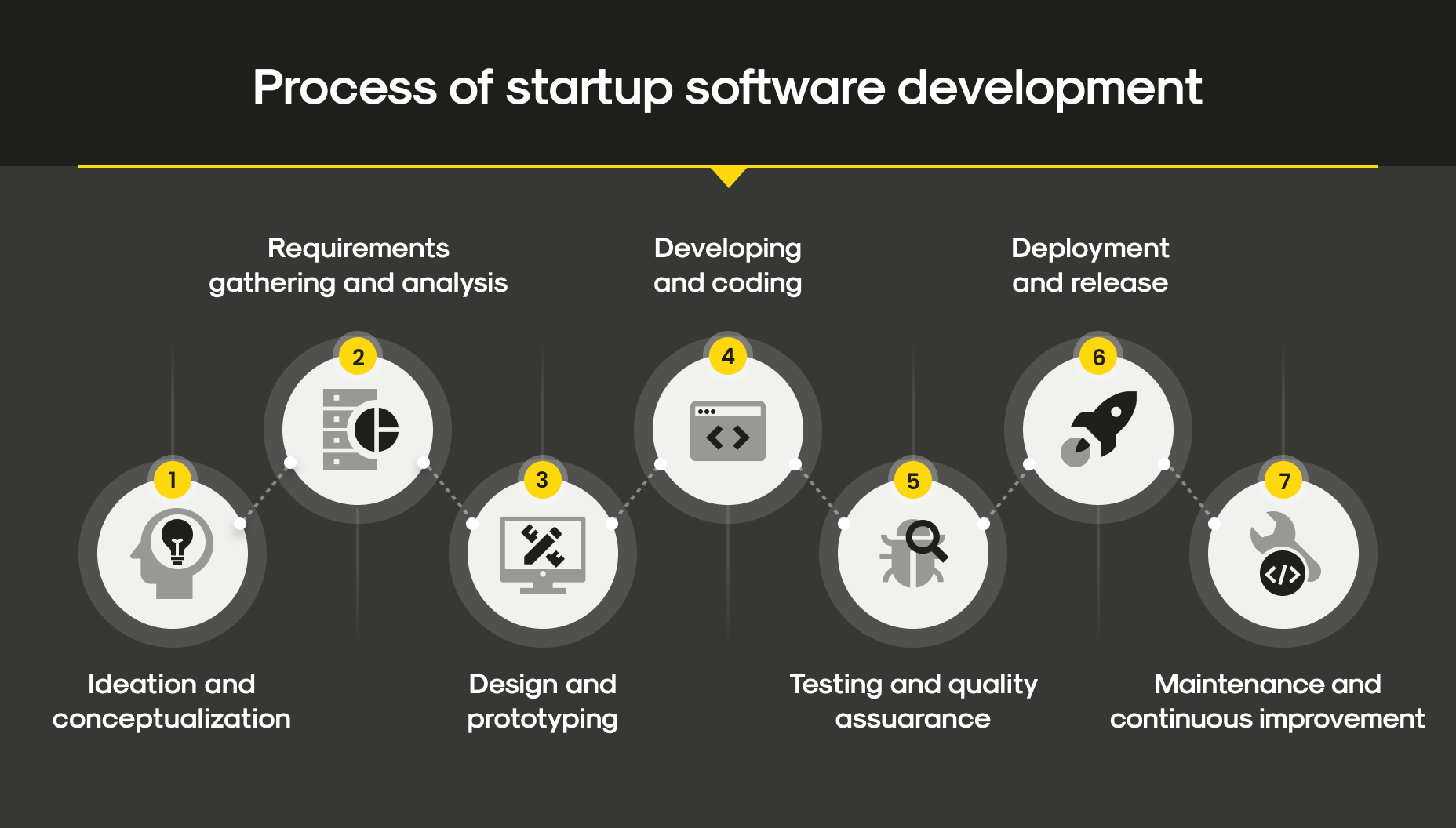Let’s face it: launching a startup is thrilling and overwhelming. You’ve got the vision, maybe even the first users lined up, but the real challenge starts when you need to turn that idea into working software. Whether you’re building the next productivity app, fintech platform, or marketplace, software development for startups is all about making smart, fast, and cost-effective choices that maximize your chance of success. In this article, you’ll learn:
- Why software development for startups requires a different playbook than for enterprises.
- What MVP development for startups really means and why it’s the cornerstone of success.
- The key benefits of building an MVP, from faster time to market to stronger investor appeal.
- How to choose the right software development company for startups and the value of distributed teams.
- What to consider when hiring developers for startup projects, including risks and compensation models.
- Common pitfalls in app development for startups and how to avoid them.
- Why outsourcing often beats in-house development in the early stages.
- A simplified roadmap for turning your idea into scalable software.
Why software development for startups is different
Big enterprises have budgets, time, and established teams while startups don’t. You’re fighting against the clock, investors want results yesterday, and the market doesn’t forgive slow launches. This is why software development for startup projects requires a different playbook:
- Speed over perfection. You don’t need a polished enterprise system; you need something users can test.
- Iterative growth. Launch, get feedback, iterate, repeat.
- Lean budgets. Every dollar matters, and hiring a full in-house team too early can sink you.
- Scalability from day one. Your first version needs to grow without a full rewrite.
In regard to all these points, choosing the right startup software development company or the right mix of developers is one of the most critical decisions you’ll make in year one.
MVP development for startups: why it matters
A Minimum Viable Product (MVP) isn’t just a buzzword you hear people talking about on social media. Instead, it’s your ticket to testing your idea with real users without burning through your runway.
What is startup MVP development?
To cut a long story short, startup MVP development is all about building the simplest version of your product that delivers core value. It’s not a prototype, and it’s not your final, polished app either. Instead, it’s the bridge between your concept and a functioning business.
For example:
- Dropbox started with a simple demo video to validate demand before building infrastructure.
- Airbnb launched with a website listing just a few apartments in San Francisco.
- Uber began as a basic app connecting riders and black car drivers.
In fact, all of these giants began with MVP development for startup projects focused on validating assumptions quickly. They learned early what users really wanted before building the full product.
Benefits of MVP development for startups
Before a startup can scale, it needs to prove its core idea works. That’s where MVP development for startups comes in. By focusing on the essentials, founders can test assumptions, validate demand, and start building traction without burning through resources. The benefits are clear:
- Faster time to market. Launch in months, not years.
- Cost efficiency. Avoid building features nobody uses.
- Investor appeal. Creating an MVP is proof you can execute.
- User feedback loops. Real customers shape your roadmap.
Whether you call it MVP development for startups, or just “getting your product out the door,” it’s the cornerstone of startup success.
Choosing a software development startup company
Here’s the hard truth: most startup teams don’t have the resources to build everything in-house. That’s where a software development company for startups comes in. These firms specialize in helping early-stage businesses translate ideas into code, often guiding founders through the product, design, and scaling journey, frequently leveraging distributed teams to provide the right expertise exactly when it’s needed
A reliable startup software development company will offer:
- End-to-end expertise. From UX/UI design to backend infrastructure.
- Domain knowledge. Experience with startup challenges like pivoting quickly or integrating with third-party APIs.
- Agile processes. Short sprints, fast iterations, and measurable progress.
- Cost transparency. Clear budgets without ballooning surprises.
The best software development companies for startups don’t just write code: they act as partners, challenging assumptions and ensuring you’re building the right product, not just the product you think you need.
Hiring developers for a startup: what you need to know
There’s always the temptation to just “find a developer” and start building (sometimes even without a technical co-founder). But hiring a developer for a startup comes with unique risks. One developer can get you started, but it can also leave you vulnerable if they leave or can’t scale the system.
Hiring developers is tough. However, when you hire developers for startup projects, consider:
- Skill breadth. Startups need generalists who can wear multiple hats, not siloed specialists.
- Cultural fit. You’re building a small team, so chemistry matters as much as skills.
- Equity vs. salary. Decide if you’ll pay cash, equity, or a mix.
- Reliability. You can’t afford long delays or disappearing freelancers.
As of today, some founders go with freelancers, others with agencies, and some prefer to hire startup developers in-house once traction grows. The right choice depends on your stage, funding, and technical needs.
App development for startups: finding your edge
As a matter of fact, most startups today need an app, whether mobile, web, or both. App development for startup projects is one of the most common ways to bring ideas to life.
Mobile-first or web-first?
- Startup mobile app development makes sense if your product lives in a user’s pocket (fitness, delivery, rideshare).
- Web-first app development startups may focus on B2B tools or marketplaces where desktop matters.
Either way, app development for startups requires balancing speed with scalability. You might start with a hybrid framework (React Native, Flutter) to move fast, then shift to native apps once you gain traction.
Startup application development pitfalls
- Overloading the MVP with “nice-to-have” features.
- Ignoring security (a critical mistake in fintech or healthtech).
- Forgetting about scalability, leading to rewrites later.
The right startup application development partner helps you avoid these traps by focusing on lean builds that evolve naturally.
Why outsourcing can beat in-house in early stages
While it might feel safer to hire a developer for startup projects internally, outsourcing often gives better ROI early on. An experienced software development startup company brings ready-made teams and infrastructure, things you can’t afford to build yourself at seed stage.
In short, outsourcing helps with:
- Faster ramp-up. No hiring delays.
- Lower risk. No dependency on a single developer.
- Proven workflows. Established processes mean fewer surprises.
Later, as you scale, you can combine outsourced teams with in-house hires, giving you flexibility and control.
The roadmap to startup success
Here’s a simplified pathway for founders considering software development for startups:
- Validate the idea. Don’t skip research.
- Define your MVP. Cut everything non-essential.
- Choose your model. In-house vs. software development companies for startups.
- Launch and iterate. Get feedback and pivot fast.
- Scale wisely. Invest in long-term architecture once product-market fit is clear.
By following this pathway, founders can move from a validated idea to a product that truly resonates with users without wasting time or resources. Start lean, iterate fast, and scale smart. Your startup’s success is about building the right software at the right time.
Key takeaways
Keep these fundamentals in mind. They’ll help you avoid common traps and give your startup the best shot at turning code into traction.
- Speed beats perfection. Launch lean, validate quickly, and improve through user feedback.
- MVPs are your launchpad. They save resources, attract investors, and prove your idea works.
- Smart partnerships matter. The right startup software development company or distributed team can help you move faster and avoid costly mistakes.
- Flexibility is your advantage. Outsourcing, team augmentation, or in-house hires: pick what fits your stage and budget.
- Scale with intention. Build with growth in mind, but don’t overengineer before product-market fit.

Process of startup software development
Every founder’s journey is different, but the principles stay the same: start small, move fast, and scale smart. Treat these takeaways as your compass when the path gets messy.
How Mitrix can help
When it comes to software development for startups, we offer a full suite of services designed specifically to turn early ideas into successful, scalable products. We know the stakes are high for founding teams as every decision matters. Here’s how Mitrix makes a difference:
- Idea screening and validation
Mitrix starts by helping you evaluate your concept and select the versions of your product idea that are most likely to succeed. This is a crucial first step in MVP development for startup ventures. Through market research and feasibility checks, you avoid common traps and build something users actually want. - MVP development and product development
Whether you need MVP development for startups, startup mobile app development, or a web-based application, Mitrix builds lean solutions fast. We take your core vision and create a minimal but robust product that delivers value without overengineering. - UX/UI design and prototyping
A smooth, intuitive user experience is one of the most important differentiators for any startup. Mitrix designs detailed prototypes so you can validate usability early. This helps reduce revisions and ensures your app or startup application development hits the right user expectations. - Launch support and ongoing maintenance
Once your MVP is ready, Mitrix helps with the launch and provides ongoing support. The team ensures smooth deployment, monitors user feedback and performance, and evolves the product. This ensures your product doesn’t just launch, it endures. - Lean, flexible, and cost-aware delivery
Mitrix adapts to your budget, timeline, and changing requirements. As a startup software development company, they understand startups need flexibility. Their lean approach ensures you get maximum value without blowing out costs. - Domain expertise and strong partnership
With experience spanning sectors such as healthcare, fintech, logistics, education, and eCommerce, our teams guide startup founders with both technical and business insight. They become not just a software development company for startups, but a strategic partner invested in your product’s success. - Support for hiring, team augmentation, and technical scale
If you decide to hire developers for startups or expand your engineering team later, Mitrix offers team augmentation. This lets you scale your engineering capacity without the overhead of full-time hiring too early. It’s an ideal bridge between outsourcing and building your internal team.
Here at Mitrix, we help startups avoid common pitfalls, move faster, and build smarter. Whether you’re seeking MVP development startup guidance, startup application development, or the support of a trusted startup software development company, we bring proven processes, expert partners, and a lean mindset so your startup gets software that works and scales.
Summing up
In 2025, building software as a startup isn’t easy, but it’s never been more accessible. With the right approach to software development for startups, you can launch faster, spend smarter, and scale stronger.
Remember: MVPs reduce risk and attract investors, while startup-focused partners ensure you don’t waste resources. Whether you hire developers for startups, work with a startup software development company, or outsource startup application development, the key is aligning your tech strategy with business goals.
In short: don’t chase perfection, but progress. Launch lean, learn from your users, and let your software grow as your startup does. The right development strategy can mean the difference between a costly misfire and the next breakout success.

